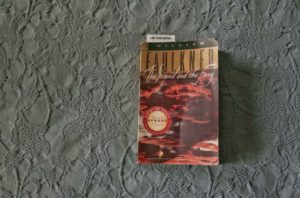Mrs Dalloway is the only Virginia Woolf novel I have read so far. When I am done reading To the Lighthouse, I will have read my second. Do you have a recommendation for my third? Here is the thing, I just really started reading. I am still within the first few pages. I don’t even know the little boy’s name. His mother is still knitting that reddish-brown stocking for the Lighthouse keeper’s little boy. She is optimistic about the morrow’s weather. But the father has spoiled his boy’s hope of having fine weather. His daydream about visiting the Lighthouse has been rudely interrupted and he is now absorbed in violent feelings for his father that seems very Freudian.
—————————————————-
Back! (3/3/15)
What I love about Woolf is that she requires your attention and when you give it, you’re rewarded. March, so far, is still a busy halo around me and the reading is still slow. But I see calmer and faster page turning days ahead. I just finished chapter ten and there have been already many things I could discuss but what is taking precedent in my thoughts is Mrs. Ramsay’s musings on happiness. The notion that our happiest years are our childhood ones is often present in my own thoughts. Mrs. Ramsay has just finished reading to James and is thinking, “Oh, but she never wants James to grow a day older!” then later in the same paragraph, “She thought, he will never be so happy again, but she stopped herself, remembering how it angered her husband that she should say that. Still, it was true. They were happier now than they would ever be again.” This holds my interest especially because I have also feel that children are much happier than adults.
I used to be convinced that we are never as happy as we were when we were children. That is if you even had the luck of a good healthy childhood. But I am beginning to feel that we are still able to be as happy. It is just that the happiness we experience after innocence is a different kind. In that it is often not built on novelty but experience and in difficult choices. As I write this, it is snowing. Perhaps a child will see beauty in the look and comforting nature of the flakes, as well as the opportunity of play. An adult, living in NYC, might think of having to go to work through black snow, the transportation system failing, the heat not working properly, that bad knee. But a matured individual could still appreciate the different stages of this event of snow. They can see the ugly and also the beauty, simultaneously.
Mrs. Ramsey is right that James might lose his childhood happiness. That kind of happiness dies because it cannot survive the many disappointments that life throws our way; the struggles to afford oneself and find solitude in being, to love and be loved. The only way that sort of childish happiness continues is through denial. But James can learn another sort of happiness that is equally, if not even more so, delightful. The adventure of living and appreciating the beauty that is; of learning and growing and laughing in pain till happiness come and crying in its relief until pain comes again.
Jane



